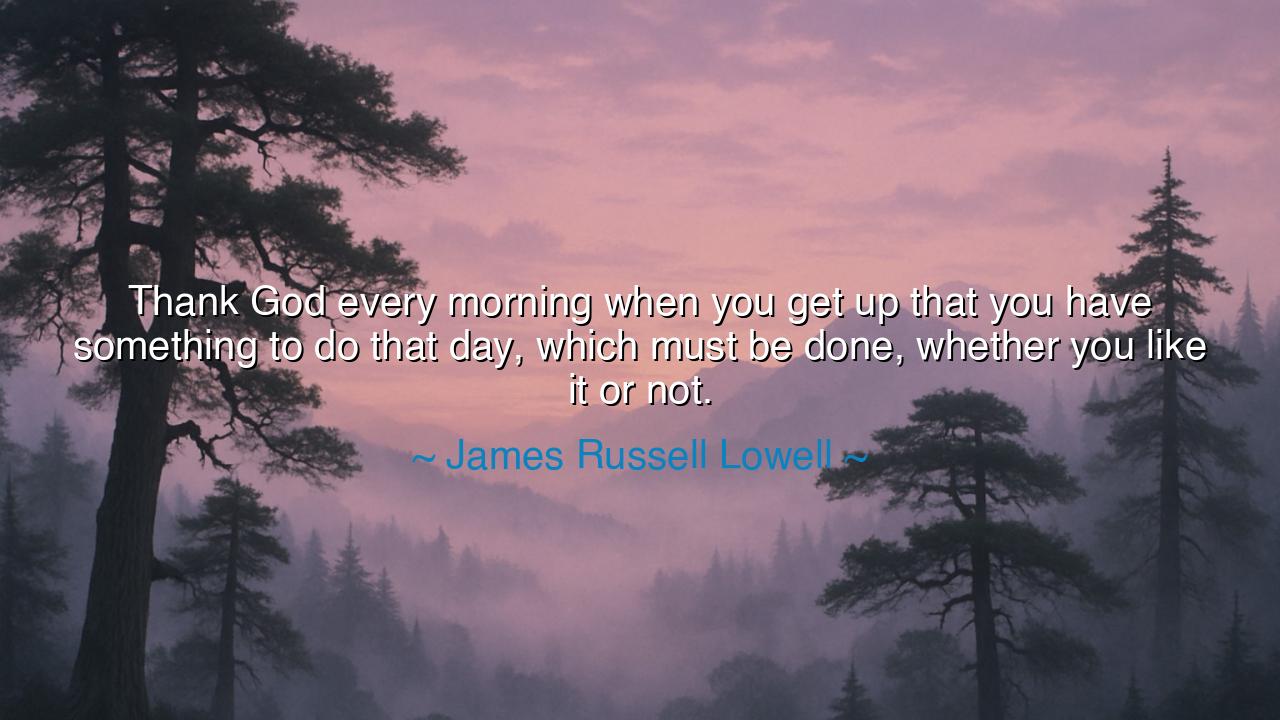
Thank God every morning when you get up that you have something
Thank God every morning when you get up that you have something to do that day, which must be done, whether you like it or not.






The words of James Russell Lowell—“Thank God every morning when you get up that you have something to do that day, which must be done, whether you like it or not”—carry the voice of the ancients, reminding us that the burden of duty is not a curse but a blessing. To awaken and find that the world has placed a task in your hands is proof that your life has meaning, that your breath is not wasted, that your days are woven into the greater tapestry of creation. Work is not merely toil; it is the evidence of purpose, the anchor of the soul, and the training ground of the spirit.
Too often the weary heart complains of obligation, wishing for leisure without end. But those who walk the path of wisdom know that endless leisure decays the soul, while duty keeps it sharp, alive, and strong. The farmer who tills the field may sweat beneath the sun, yet he knows the field will feed his family. The soldier who keeps the night watch may grow weary, yet he knows his watch keeps his people safe. To wake with something to do is to wake with meaning, and that is wealth greater than gold.
History has shown us this truth in radiant form. Consider George Washington at Valley Forge, where the winter winds cut like blades, and his men, ragged and starving, longed for rest. Washington did not thank God for comfort—there was none. He thanked God for duty, for the cause placed in his charge, for the unyielding necessity to rise each morning and lead. His task was bitter, often thankless, yet in it lay the seed of a nation. So too with us: though our tasks may seem small, though they may chafe against our desires, they are the threads from which destiny is woven.
The emotional weight of Lowell’s teaching lies in its reversal of perspective. What many curse—obligation, responsibility, work—he calls us to bless. He whispers across the centuries: Be grateful for the very things you resist, for they are the scaffolding that upholds your life. Even the chores of the day, the letters to write, the fields to plow, the children to teach—these are sacred acts, binding you to the world, reminding you that you still belong, that you still matter.
For the seeker of wisdom, the lesson is luminous: give thanks for duty as much as for joy. Without duty, joy becomes hollow. Without labor, leisure becomes meaningless. It is the weight of responsibility that gives strength to the back, clarity to the mind, and dignity to the soul. To wish away all work is to wish away your purpose. To embrace it is to stand in harmony with the order of life.
What then should one do? Each morning, rise with gratitude, not only for the gifts you love, but for the burdens you would rather avoid. Speak to your heart: “This too is a gift, for it proves I have a place in the world.” Approach each task not with resentment but with reverence, for every duty completed polishes the soul like a blade upon the stone. And when the task seems too heavy, remember that it is in the lifting of heavy loads that strength is born.
Thus, Lowell’s words are not mere instruction, but a hymn to life itself: thank God for something to do. For one day will come when the morning dawns and no tasks remain, when your hands will fall still. On that day, work will be taken from you. Until then, count each duty as a blessing, each task as a prayer, and each day of labor as proof that you yet walk among the living with purpose in your heart.






AAdministratorAdministrator
Welcome, honored guests. Please leave a comment, we will respond soon